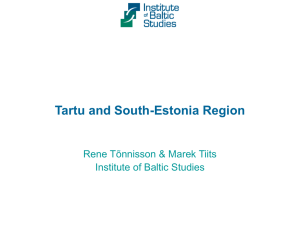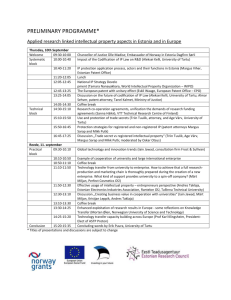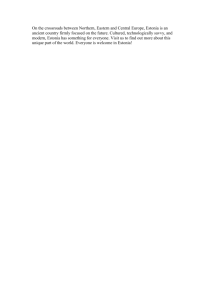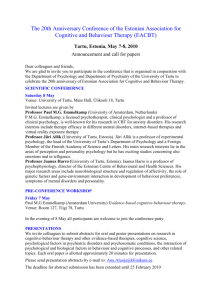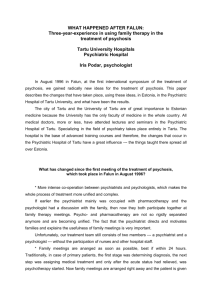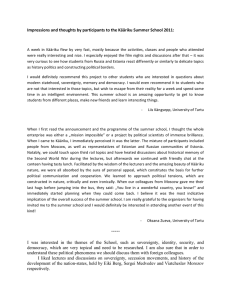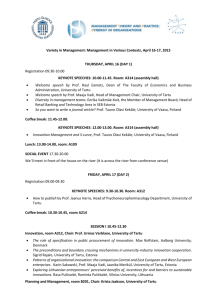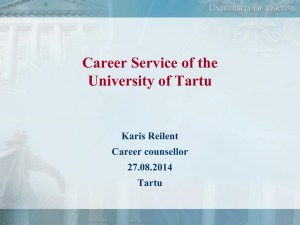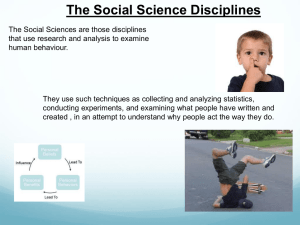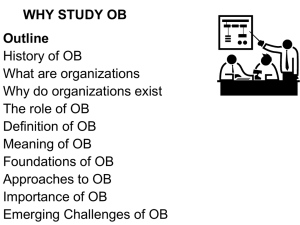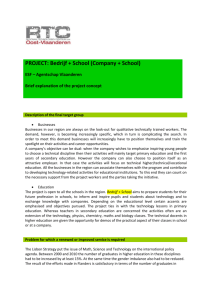Toivo Maimets
advertisement
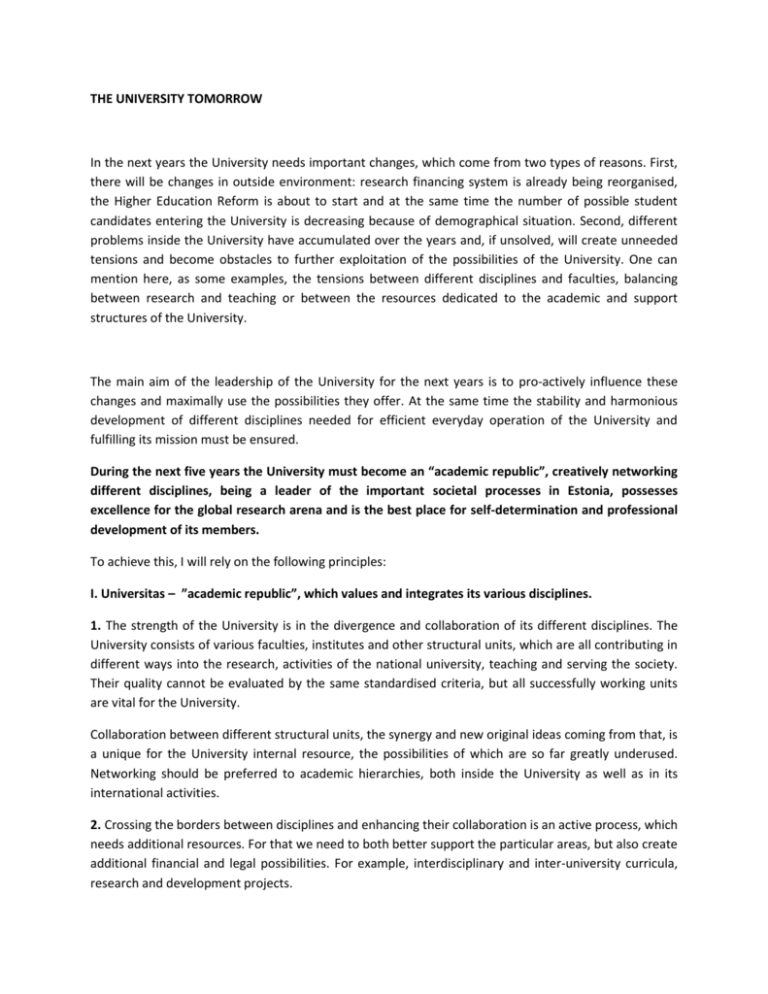
THE UNIVERSITY TOMORROW In the next years the University needs important changes, which come from two types of reasons. First, there will be changes in outside environment: research financing system is already being reorganised, the Higher Education Reform is about to start and at the same time the number of possible student candidates entering the University is decreasing because of demographical situation. Second, different problems inside the University have accumulated over the years and, if unsolved, will create unneeded tensions and become obstacles to further exploitation of the possibilities of the University. One can mention here, as some examples, the tensions between different disciplines and faculties, balancing between research and teaching or between the resources dedicated to the academic and support structures of the University. The main aim of the leadership of the University for the next years is to pro-actively influence these changes and maximally use the possibilities they offer. At the same time the stability and harmonious development of different disciplines needed for efficient everyday operation of the University and fulfilling its mission must be ensured. During the next five years the University must become an “academic republic”, creatively networking different disciplines, being a leader of the important societal processes in Estonia, possesses excellence for the global research arena and is the best place for self-determination and professional development of its members. To achieve this, I will rely on the following principles: I. Universitas – ”academic republic”, which values and integrates its various disciplines. 1. The strength of the University is in the divergence and collaboration of its different disciplines. The University consists of various faculties, institutes and other structural units, which are all contributing in different ways into the research, activities of the national university, teaching and serving the society. Their quality cannot be evaluated by the same standardised criteria, but all successfully working units are vital for the University. Collaboration between different structural units, the synergy and new original ideas coming from that, is a unique for the University internal resource, the possibilities of which are so far greatly underused. Networking should be preferred to academic hierarchies, both inside the University as well as in its international activities. 2. Crossing the borders between disciplines and enhancing their collaboration is an active process, which needs additional resources. For that we need to both better support the particular areas, but also create additional financial and legal possibilities. For example, interdisciplinary and inter-university curricula, research and development projects. 3. The University of Tartu must become much more active partner in communicating with the society, opinion former and leader of changes, initiator of processes, not only the one reacting to them. Public opinions formulated by the University are important for the society in all areas, not just in (higher) education and research. 4. Problems of the units are problems of the whole University and, if needed, the solutions must be sought for together. For example, the problems of teaching costs of “small courses”, problems coming from the decrease of earnings from tuition fees, extraordinary costs of non-standard structures or exploitation costs of new and more expensive buildings. II. The quality of academic research-based higher education. 5. The University of Tartu is a research university – it is based on the unity of research and teaching. Over the years, the University has developed excellent research in many areas, which is at top international frontline. Continuous support to these must now be accompanied by taking also more care of professional teaching activities and valuing them accordingly. 6. The research or education reform targeting the quality of these activities cannot be created from outside University, as it has the best competence in these areas. The University must create a comprehensive quality system for higher education, which can be a guide for Ministry and other universities. 7. Research and teaching must be more efficiently connected with each other. Young researchers must be involved in teaching activities since early days of their career. The teaching staff must get time and conditions for performing successful research. At the same time, the choice of instruments used to assess and value the creative work of teachers should be considerably widened. III. Dignified position of members of the University, salary and working conditions. 8. The people who care of their University are its most precious resource. Every member of the University has the right and obligation to be involved in the processes of decision-making. To achieve it, the meetings of university governing bodies (Council, Senate, rectorate) with Faculty Councils must become regular. 9. The academic quality of teachers and researchers is of utmost importance for the development of the University. The assessment of quality must be based mainly on principal expert evaluations and less on formal criteria. Together with the increase of academic standards the University must also support the personal development of its members and shaping their academic advancement. Attention must be paid on the whole academic career, starting from motivation and certainty of young starting academics and finishing with dignified conditions of retirement. It is time to consider the employer’s pension scheme. 10. All possible internal and external resources must be mobilised to achieve the levels of salaries as two, three, or four times of average salary in Estonia for lecturers, assistant professors and professors respectively. IV. The best conditions of personal development and self-determination for our students. 11. Demographic situation in Estonia increases the competition for the best student candidates and this competition will occur – contrary to the one in research – first of all inside Estonia. To increase the competitiveness the attention should be first of all paid to the quality of our education, but also to the overall reputation of the University and the quality of living environment. As for the latter, a good collaboration with Tartu city authorities is self-evident. For all students with bachelor degrees Tartu should be the first choice for their master studies. 12. Systematic contacts with Estonian young people studying abroad must be established in order to make Tartu as a natural place for further career after their graduation. 13. The increased share of students participating in the elections of Student Council is an indicator of its increased importance and value. The Student Body and its leading organisations must be supported by creating for them working conditions well comparable with those of other universities. The opinions of students about changes of regulations and laws are very important and desired. V. Financing 14. The University must more actively speak up at the level of the country in the area of financing research and higher education, being an active leader of these discussions. The University has plenty of expertise for defining strategic trends and targets for the whole society. 15. Bringing external resources, both national and international, into the University must be encouraged by assisting in the formulation of applications and rewarding success. 16. The structures supporting the academic activities of the University must use as much resources as needed and as little of them as possible. The assessment of this balance is a professional activity based on expert evaluations and the responsibility for its implementation must be personal. The supporting structures must undergo periodical international evaluation procedures, similarly to the research projects and curricula of the University. 17. All university property, including estate property, must be carefully taken care of and developed. At the same time it should be kept in mind that without dedicated people this property will never create anything new. Overall shaping and design on the budget must start from the interests of the main activities of the University – research and teaching – and support them in the most efficient ways. Toivo Maimets May 2012
